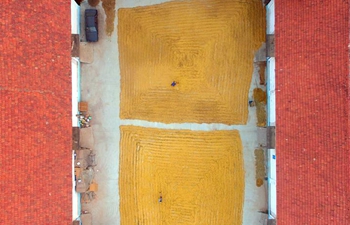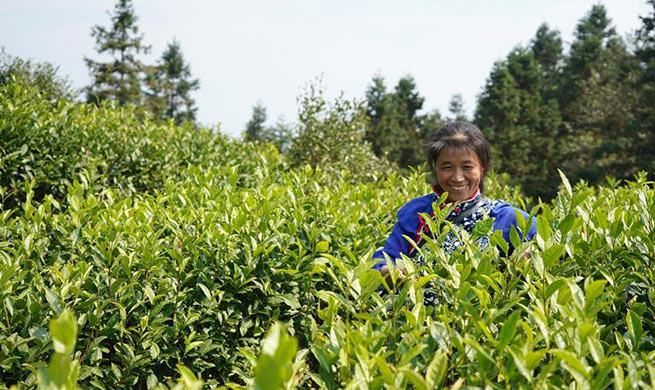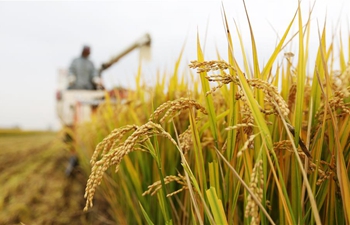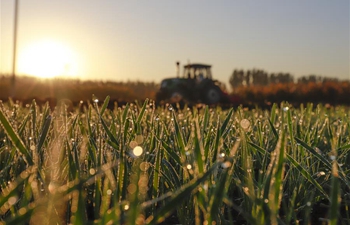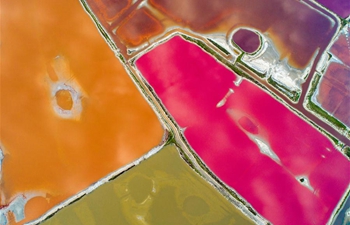SWEIDA, Syria, Oct. 8 (Xinhua) -- Although fast food is favored by many people nowadays, the natural and traditional food of grape molasses has maintained its popularity in southern Syria.
Farmers in Sweida province in southern Syria, which is well known for having one of the best and sweetest grapes in the country, are welcoming the harvest season for grapes every year around this time.
The grape molasses, made of pressed grape, has been known in the region for a very long time possibly before honey.
The thick black sweet syrup is perceived by the people in Sweida as being extremely healthy and help them fight many illnesses as it is rich in natural elements such as iron and potassium.
Every year around this time when the grapes get sweeter, farmers will choose the suitable grapes to make the molasses, which later finds itself on the table of almost every household in Sweida to be taken with tahini.
Abu Adnan, a 62-year-old farmer who owns a grape orchard in the Memas village in Sweida countryside, told Xinhua that the process of making molasses has beautiful rituals.
He said young men and women help their families in the harvest process, which starts with harvesting the grapes after they become sweeter.
They move from one place to another to harvest enough grapes to move them to winepress, where the grapes get squeezed so the juice would later be turned into molasses, the man said.
Salim Kiwan, another 70-year-old farmer, told Xinhua that the making of grape molasses has been inherited from their ancestors, adding that the farmers keep this tradition alive despite the more than seven-year-old war in Syria, during which the sales of the food were largely affected.
He said that the high prices of pesticides as well as the labor wages have also affected the farmers "but that did not stop us from making the grape molasses or tell it to our children or grandchildren."
He said making the molasses in Sweida is a fun time for the family members and friends, who spend entire nights preparing the molasses while socializing and catching up as the harvest time is a yearly tradition in Sweida.
"First we take a special type of grapes known as the Salti grapes as they are the most proper to make molasses. Afterward, we clean them by washing them with water to remove the dust and then we unravel the grape clusters and put them in stone bowels where they are squeezed," he said.
Afterward, "we take the juice and put it in canvas or hanging bags, which contain a special kind of white soil called al-Hur to purify the juice and remove impurities and acidity from it and leave it for a full day," Kiwan said.
Later the juice gets placed in pots over firewood stoves where it boils until the juice condenses and becomes sticky like honey.
After cooling, the syrup becomes ready to be packed in special glass jars that should be well-sealed until use.
Munther Abu Taim, a resident of Sweida, said he enjoyed going to the grape orchards at the time of the harvest for the making of the grape molasses.
He said his friends in Damascus, who are able to get this molasses from supermarkets, prefer to ask him to get them some from Sweida.
"Every year in October, I ask my friends whether they want me to bring them some molasses and they welcome it so much as many of them have been informed about this delicious sweet food from me," he said.
Taim said the grape molasses can be found in every house in Sweida as people use it as both a sweetener and a separate dish with tahini due to its perceived health benefits.
"It is good to tell people, who are drowned in the fast food life nowadays that returning to the Mother Nature is the best thing to do in order to maintain a healthy life without any of the illnesses that we witness nowadays," he said. Enditem








